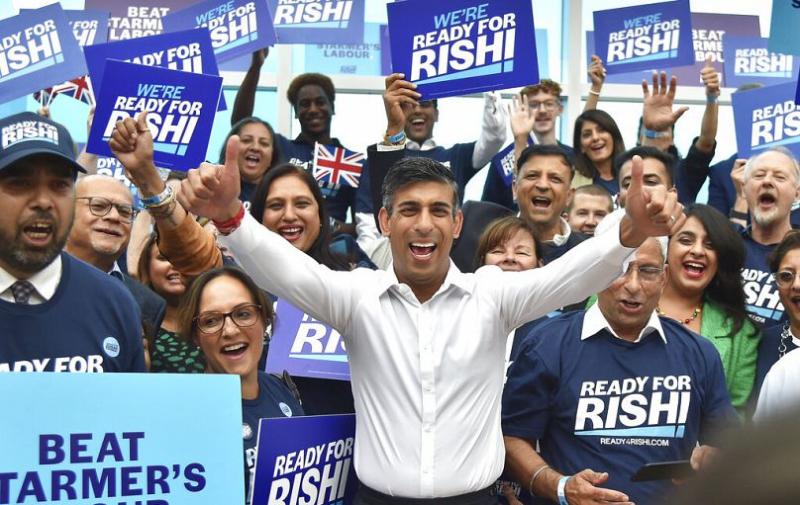We live in the age of the undecided voter
Politicians across the West face no shortage of crises. In addition to fizzing inflation that is crippling household finances, they must contend with a shrinking working-age population squeezing government budgets.
ADVERTISEMENTMeanwhile, tensions between China and the US threaten to disrupt global stability. To the long list of problems plaguing Western governments, you can now add the rise of the undecided voter.
Across Europe and the US, people are less entrenched in their political preferences than ever before.
In the recent Spanish election in July, the share of undecided voters rose from 16% in 2019 to 23% according to Unidad Electoral, and a study by Gallup found that the share of US adults identifying as independent reached 49% in 2023, an all-time high.
In the UK, millions of uncertain voters are set to decide the next election; a poll by YouGov found that 17% of voters are still standing at the crossroads, uncertain about which political path to tread.
What is causing this shift, and what does it mean for the future of politics?
Insecurities, crises and the power of social media
In part, domestic factors are behind the emergence of swing voters. In Spain, ever since voters angered by corruption split a two-party system into a four-party one in 2015, the country has been grappling with political instability, which has made voters more uncertain about their choices.
Social media and online news sources have fundamentally altered how people access information and engage with political discourse, as they amplify political polarisation and influence voters' opinions in real-time.This was palpable during Spain’s July election, when PSOE managed to convince undecided voters to vote for them in the final days of the campaign, preventing PP from forming a government with the far-right Vox as most polls had predicted.
Meanwhile, in the UK, disillusionment with the Conservative Party has left centre-right voters in a state of limbo, unsure of their political allegiance.
Rishi Sunak meets supporters as he arrives to attend a Conservative Party leadership election hustings at the NEC, Birmingham, August 2022AP Photo/Rui VieiraHowever, most of the factors contributing to the rise of undecided voters are common across borders.
The cost of living crisis, for instance, has pushed many voters to consider alternatives, as dissatisfaction with the status quo incentivises voters to engage in protest votes that do not necessarily reflect their traditional view.
- Tough talk in Poland's election may not be enough to win votes
- Conspiracy theories and disinformation mar UK local election
Moreover, social media and online news sources have fundamentally altered how people access information and engage with political discourse, as they amplify political polarisation and influence voters' opinions in real-time.
ADVERTISEMENTThis constant exposure to conflicting information can make it challenging for voters to firmly commit to a single political ideology or party.
Policies over party loyalties
Another significant shift is that voters are increasingly prioritising specific policy issues such as the green transition or gender laws over traditional party loyalty.
Rishi Sunak’s Conservatives narrowly held on to the Uxbridge and South Ruislip seat in an unexpected parliamentary by-election result in July due to concerns over a planned extension of the “ultra low emissions zone” — a charge on dirty vehicles — to outer London boroughs planned by the capital’s Labour mayor Sadiq Khan.
With the days of unwavering party loyalty dwindling, parties must evolve to win over undecided voters.And in Spain, Unidas Podemos’ policies on gender and identity politics have alienated voters: the party did so badly in the May regional elections that it had to limp into a new left-wing formation called Sumar, formed by the labour minister, Yolanda Díaz.
A torn PP election campaign poster showing the face of party leader Alberto Nunez Feijoo, hangs from a lampost in Madrid, July 2023AP Photo/Paul WhiteThe surge in voter volatility has profound consequences for modern democracies. Firstly, political adaptability will become essential to survive.
ADVERTISEMENTWith the days of unwavering party loyalty dwindling, parties must evolve to win over undecided voters.
In turn, campaigns will be more determinant than before.
Fluctuation electorates will redefine modern politics
Spain demonstrated in July that elections are increasingly unpredictable as a significant portion of the electorate remains up for grabs, so parties must craft dynamic and persuasive campaign strategies to sway these voters in their favour.
- Turkey: Could far-right voters be the deciding factor in Sunday’s presidential election?
- Spain’s climate election: Could heatwaves and the drought-stricken Doñana wetlands influence voters?
With a share of the electorate in flux, parties’ terms in office will become shorter, undermining countries’ ability to address pressing long-term challenges, such as climate change, ageing populations, or fiscal sustainability, as these issues demand sustained commitment and a clear, long-range vision.
As governments learn to navigate a more uncertain world, one thing is clear: the power of the undecided voter is redefining modern politics.
ADVERTISEMENTCarla Subirana is an economist who has worked as a policy analyst for the Bank of England and Europe analyst for Economist Intelligence.
At Euronews, we believe all views matter. Contact us at view@euronews.com to send pitches or submissions and be part of the conversation.
منبع خبر: یورو نیوز ![]()
اخبار مرتبط: We live in the age of the undecided voter
حق کپی © ۲۰۰۱-۲۰۲۴ - Sarkhat.com - درباره سرخط - آرشیو اخبار - جدول لیگ برتر ایران

